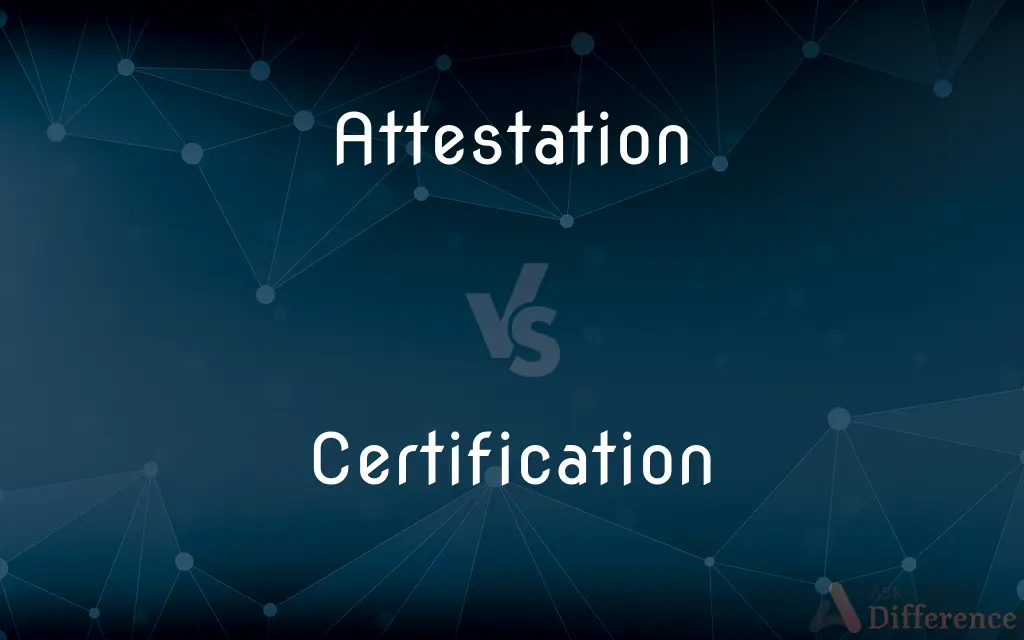Attestation vs. Certification — What's the Difference?
By Urooj Arif & Fiza Rafique — Updated on March 5, 2024
Attestation is the act of witnessing or affirming the truth of something, often a document's authenticity, by a third party. Certification is a formal process by which an individual or organization is verified to meet specific standards or qualifications.

Difference Between Attestation and Certification
Table of Contents
ADVERTISEMENT
Key Differences
Attestation involves a third party verifying the accuracy or authenticity of information, documents, or statements, often used in legal, educational, and professional contexts. It serves as evidence that due diligence was followed in verifying the document's content. Certification, on the other hand, is a formal endorsement by an authoritative body that an individual, product, or organization meets predetermined standards, often requiring an examination or evaluation process.
While attestation can be as simple as a signature or official seal confirming that a document is true and correct, certification typically involves a more comprehensive assessment and is often associated with professional qualifications, product safety, or quality standards. Attestation may be a part of the certification process, serving as a component of the broader evaluation.
Attestation is primarily concerned with the authenticity of documents and statements, ensuring they are accurately represented. Certification focuses on compliance with specific standards or competencies, indicating a level of proficiency or quality. For instance, a university diploma can be attested to confirm its legitimacy, whereas a professional may be certified to demonstrate expertise in a particular field.
The authority to attest comes from legal recognition or professional standing, allowing the attester to confirm the validity of a document. Certification authorities are usually specialized organizations or regulatory bodies that set and maintain the standards for the areas they govern. These bodies also conduct assessments and issue certifications.
Both attestation and certification are critical in various sectors for ensuring trust, authenticity, and compliance. Attestation provides a layer of verification for documents, while certification assures stakeholders of quality, safety, or competency. The choice between attestation and certification depends on the context and requirements at hand, with each serving distinct yet sometimes complementary roles.
ADVERTISEMENT
Comparison Chart
Purpose
To affirm the truth or accuracy of documents, information, or statements.
To verify that an individual, organization, or product meets specific standards.
Process
Involves witnessing, signing, or sealing by a third party.
Involves evaluation, testing, or assessment by an authoritative body.
Authority
Given by legal or professional standing.
Issued by specialized organizations or regulatory bodies.
Application
Legal, educational, professional documents.
Professional qualifications, product standards, organizational compliance.
Outcome
Verification of authenticity or truth.
Formal endorsement of compliance or qualifications.
Compare with Definitions
Attestation
An act of affirming something to be correct.
The attestation of her qualifications was required for the application.
Certification
Recognition by an authoritative body.
The product received environmental certification for its sustainability.
Attestation
Confirmation of document authenticity by a third party.
The embassy provided attestation services for my diploma.
Certification
A document proving completion of requirements.
He proudly displayed his certification in cybersecurity.
Attestation
Verification of signatures or statements.
His job involved attestation of legal documents.
Certification
Endorsement of professional skills.
Her certification in project management helped advance her career.
Attestation
A formal declaration that information is true.
The notary's attestation confirmed the contract's validity.
Certification
A formal process verifying qualifications or standards.
After passing the exam, she received her teaching certification.
Attestation
Proof of authenticity or compliance.
Attestation by a certified accountant was necessary for the financial report.
Certification
Assurance of quality or performance.
The certification process for the equipment was rigorous.
Attestation
A thing that serves to bear witness, confirm, or authenticate; validation, verification, documentation.
Certification
Certification is the formal attestation or confirmation of certain characteristics of an object, person, or organization. This confirmation is often, but not always, provided by some form of external review, education, assessment, or audit.
Attestation
The process, performed by accountants or auditors, of providing independent opinion on published financial and other business information of a business, public agency, or other organization.
Certification
The act of certifying.
Attestation
The act of attesting; testimony; witness; a solemn or official declaration, verbal or written, in support of a fact; evidence. The truth appears from the attestation of witnesses, or of the proper officer. The subscription of a name to a writing as a witness, is an attestation.
Certification
The state of being certified.
Attestation
The evidence by which something is attested
Certification
The act of certifying or bestowing a franchise on
Certification
Confirmation that some fact or statement is true
Common Curiosities
How long does certification last?
The validity of a certification can vary, often requiring renewal or continuing education to maintain.
Can a document be both attested and certified?
Yes, a document can be attested to verify its authenticity and also certified if it meets specific standards or qualifications.
Can attestation be done by anyone?
Attestation must be done by a third party with the legal authority or recognized professional standing to affirm the truth of the document or statement.
What is the difference between accreditation and certification?
Accreditation refers to the recognition of an institution or program's competence, while certification refers to the recognition of an individual's or product's qualifications or standards.
Is certification always required for professional work?
While not always mandatory, certification can significantly enhance professional credibility and opportunities in many fields.
Can attestation be digital?
With advancements in technology, digital attestation is becoming more common, using electronic signatures and seals.
What happens if a certification is revoked?
If a certification is revoked, the individual or organization loses the recognized status and must meet the necessary requirements to regain it.
Are there international standards for certification?
Yes, many fields have international standards for certification to ensure global recognition and consistency.
Is a certification legally binding?
While certification itself may not be legally binding, it can be a requirement for certain professional practices or regulatory compliance.
Can attestation affect the legal standing of a document?
Yes, attestation can be a crucial factor in determining a document's legal validity and enforceability.
Who can issue certifications?
Certifications are issued by authoritative bodies or organizations with governance over the specific standards or qualifications.
How often do certification standards change?
Certification standards can evolve to reflect industry advancements, regulatory changes, or new safety and quality benchmarks.
How can I verify someone's certification?
Verification can typically be done through the issuing organization's website or by contacting them directly.
Are certifications recognized globally?
While many certifications have international recognition, specific acceptance can vary by country and industry.
What role does ethics play in attestation and certification?
Ethics is foundational, ensuring that attestation and certification processes are conducted with integrity, transparency, and accountability.
Share Your Discovery

Previous Comparison
Trucking vs. Haulage
Next Comparison
Transfer vs. TranslateAuthor Spotlight
Written by
Urooj ArifUrooj is a skilled content writer at Ask Difference, known for her exceptional ability to simplify complex topics into engaging and informative content. With a passion for research and a flair for clear, concise writing, she consistently delivers articles that resonate with our diverse audience.
Co-written by
Fiza RafiqueFiza Rafique is a skilled content writer at AskDifference.com, where she meticulously refines and enhances written pieces. Drawing from her vast editorial expertise, Fiza ensures clarity, accuracy, and precision in every article. Passionate about language, she continually seeks to elevate the quality of content for readers worldwide.
















































